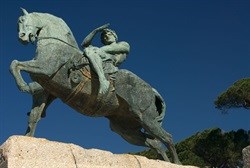Once in a while, a little voice asks me: "What were you thinking?" It belongs to an inconstant ghost that might suddenly appear when I am having a good laugh over drinks with cherished friends I met at Oxford. Or while I listen to a young, ambitious woman at pains to demonstrate how she stacks up to the attributes of the ideal scholar as set out in Cecil John Rhodes' will. Or when students at the University of Cape Town demand that #RhodesMustFall. What was I thinking, filling out forms, rehearsing answers in front of the mirror, rounding up referrals?
But most of the time, when the pesky ghost is not with me, I am a proud Rhodes scholar, who continues to support the aims of the trust by giving some of my time to its local secretariat...
A black woman from Hammanskraal, I'm obviously not what the colonist had in mind when he wrote his will.
There are moments when I meet admirers of Rhodes who delight the ghost. Oblivious to, or wilfully ignorant of, the chaos and savagery that Rhodes wrought over southern Africa, they dismiss any criticism of the man.
Or they think that the scholarship erases his misdeeds. These are rare creatures, for most people are able to follow the consequences of his action to our present times, and to place his bequest in that context.
The call to have Rhodes's statue removed from the University of Cape Town (UCT) forces a confrontation, once again, with how modern SA memorialises those who have shaped it with the blunt tools of domination.
It's a debate that one would have hoped would be behind us by now. That, instead of being haunted by the past, we should have crafted a constructive narrative about it 21 years into democracy.
It is a difficult debate because humanity is messy and complex. Here is a man who had little regard for the dignity of black people but who instructs that the scholars he will fund should embody the qualities of "truth, courage, devotion to duty".
The words of his will, limited as it was by the sexism and racism of the time, betray a man who can still recognise some universal virtues.
These contradictions, Rhodes the pillager and Rhodes the benefactor, are a symbol of our country's evolution towards a yet to be attained just and inclusive order.
Can we allow the statue to stand on that argument? As one speaker at a gathering in UCT argued, removing the statue from its prominent position should not mean the end of critical engagement with Rhodes' legacy.
This is not to ignore that philanthropy is in itself an exercise of power.
It is a reflection of who is allowed to accumulate resources in the first place. And Rhodes not only exploited his position as a white man in a colonial society, he vigorously fought to close any and all avenues for my forebears to create wealth.
Rhodes wanted his scholars to "fight the world's fight". It is telling how that fight has changed over time. The statue might stand, the world is still unjust, but Rhodes' world view has already fallen.
As for the statue's prospects, I do not have much advice for the university on how it should resolve its dilemma, given my own occasional angst about my relationship to the man's legacy. If it remains, it has to be on different terms. It cannot stand unchallenged and without contextualisation.
Through a realistically worded citation and continuing dialogue, the figure has to be reimagined as a call to action to break away from a past of exploitative, patriarchal capitalism. This seems most easily accomplished in a museum.
For now, to borrow from hip-hop wordsmiths, all I can say is: UCT, stand up.





































